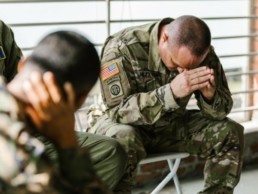3 Ways to Support a Beloved Veteran with PTSD
Veterans have provided a great service to our country and it often comes with significant personal sacrifice. Whether they have been home for several years or just returned from deployment, conditions such as post-traumatic stress disorder (PTSD) can develop and persist. In fact, between 11 to 12% of veterans who served in the Gulf War, and the Iraqi Freedom and Enduring Freedom operations suffer from PTSD; the figure is even greater at 30% for veterans who served in Vietnam.
Loved ones play a significant role in supporting veterans with PTSD and can make a huge difference with it comes to their quality of life. Here are three ways you can support your loved one if they are suffering from PTSD:
Educate and raise awareness
Educating yourself and raising awareness for others is key to supporting a loved one with PTSD. It is a serious condition that, if left untreated, can lead to depression, drug and alcohol abuse, incarceration, and even suicide. The need for education and awareness is evident by just how common it is, which is often ignored, misinterpreted, and even sensationalized by the media. With the number of diagnosed cases jumping to 50% in the past year alone, people must be made aware of this condition to reduce the stigma attached to it.
There are various misconceptions that people have about PTSD. For one, it is often thought that the condition develops immediately after a traumatic experience when PTSD can actually surface years after the event has passed. However, it is possible to recover from PTSD, contrary to popular belief, and maintaining the right treatment program on a consistent basis is the key to achieving rehabilitation.
Ensure veterans are cared for
Reintegrating back into normal life can be difficult for veterans, even years after they have served. It is especially challenging for veterans under unique circumstances, such as those with physical and psychosocial medical conditions like permanent injuries or PTSD. According to the US Department of Veteran Affairs, about 1.7 million veterans received mental health services last year.
Navigating these conditions to live life to the full can be challenging without support, which is why veterans need special care. In these cases, it is helpful to enlist the help of healthcare professionals, like nurses. Nurses with MSN qualifications are great because they are experienced in dealing with holistic health, which is especially valuable when reintegrating veterans back into civilian life. They’re adept at administering preventive and psychosocial care and making evidence-based decisions while being compassionate to their patient’s needs. These professionals understand the nuances that come with veterans’ sometimes complex needs and implement programs that are crucial to their recovery. By doing so, you can help support your loved one with the proper interventions during such a critical time.
Help veterans adjust at home
Creating a healthy home life is of the utmost importance for veterans with PTSD. One of the most difficult parts of transitioning from military to civilian life once again is adjusting to life at home. Veterans may find switching from strict rules in military life to a more relaxing environment a bit disorienting. Helping them maintain a comfortable home environment can help them tremendously, while also being extremely patient with them during this time.
Friends and family can help veterans find a home, whether that’s a new apartment or house. For veterans that live with their loved ones, the arrangements must be well suited for the person returning home. This should include considerations for the survival skills they have learned, how they manifest at home, and how the family can adjust to assist them. Understanding how the need for safety, anger, and even mission orientation affects the dynamics at home can allow you to find a compromise to help veterans grow accustomed to civilian life once again. If needed, it will also allow you to seek help, whether from a nurse or another qualified professional.
Ultimately, supporting a beloved veteran should be aligned with their goals for recovery and reintegration. Asking for help from professionals, family members, and friends can make the experience much easier, and it can aid in your loved one’s recovery from PTSD.
The article was written by Reggie Ann James
Exclusively for PURPLE HEART FOUNDATION

